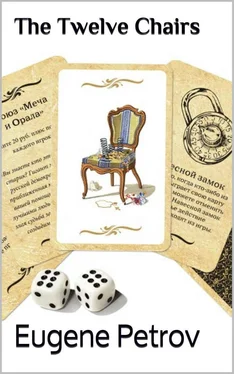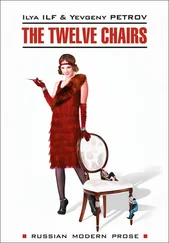Eugene Petrov - The Twelve Chairs
Здесь есть возможность читать онлайн «Eugene Petrov - The Twelve Chairs» весь текст электронной книги совершенно бесплатно (целиком полную версию без сокращений). В некоторых случаях можно слушать аудио, скачать через торрент в формате fb2 и присутствует краткое содержание. Год выпуска: 2013, Жанр: Юмористическая проза, на английском языке. Описание произведения, (предисловие) а так же отзывы посетителей доступны на портале библиотеки ЛибКат.
- Название:The Twelve Chairs
- Автор:
- Жанр:
- Год:2013
- ISBN:нет данных
- Рейтинг книги:5 / 5. Голосов: 1
-
Избранное:Добавить в избранное
- Отзывы:
-
Ваша оценка:
- 100
- 1
- 2
- 3
- 4
- 5
The Twelve Chairs: краткое содержание, описание и аннотация
Предлагаем к чтению аннотацию, описание, краткое содержание или предисловие (зависит от того, что написал сам автор книги «The Twelve Chairs»). Если вы не нашли необходимую информацию о книге — напишите в комментариях, мы постараемся отыскать её.
Find traces of a separate headset difficult and heroes face different adventures and troubles.
The Twelve Chairs — читать онлайн бесплатно полную книгу (весь текст) целиком
Ниже представлен текст книги, разбитый по страницам. Система сохранения места последней прочитанной страницы, позволяет с удобством читать онлайн бесплатно книгу «The Twelve Chairs», без необходимости каждый раз заново искать на чём Вы остановились. Поставьте закладку, и сможете в любой момент перейти на страницу, на которой закончили чтение.
Интервал:
Закладка:
broad chest with air, and said:
"Well, friend, make your pockets ready. We'll go to the club just
before dawn. That's the best time. The watchmen are asleep, having sweet
dreams, for which they get fired without severance pay. In the meantime,
chum, I advise you to have a nap."
Ostap stretched himself out on the three chairs, acquired from
different corners of Moscow, and said, as he dozed off:
"Or my valet . . . a decent salary. No, I was joking. . . . The
hearing's continued. Things are moving, gentlemen of the jury."
Those were the smooth operator's last words. He fell into a deep,
refreshing sleep, untroubled by dreams.
Ippolit Matveyevich went out into the street. He was full of
desperation and cold fury. The moon hopped about among the banks of cloud.
The wet railings of the houses glistened greasily. In the street the
flickering gas lamps were encircled by halos of moisture. A drunk was being
thrown out of the Eagle beer-hall. He began bawling. Ippolit Matveyevich
frowned and went back inside. His one wish was to finish the whole business
as soon as possible.
He went back into the room, looked grimly at the sleeping Ostap, wiped
his pince-nez and took up the razor from the window sill. There were still
some dried scales of oil paint on its jagged edge. He put the razor in his
pocket, walked past Ostap again, without looking at him, but listening to
his breathing, and then went out into the corridor. It was dark and sleepy
out there. Everyone had evidently gone to bed. In the pitch darkness of the
corridor Ippolit Matveyevich suddenly smiled in the most evil way, and felt
the skin creep on his forehead. To test this new sensation he smiled again.
He suddenly remembered a boy at school who had been able to move his ears.
Ippolit Matveyevich went as far as the stairs and listened carefully.
There was no one there. From the street came the drumming of a carthorse's
hooves, intentionally loud and clear as though someone was counting on an
abacus. As stealthily as a cat, the marshal went back into the room, removed
twenty-five roubles and the pair of pliers from Ostap's jacket hanging on
the back of a chair, put on his own yachting cap, and again listened
intently.
Ostap was sleeping quietly. His nose and lungs were working perfectly,
smoothly inhaling and exhaling air. A brawny arm hung down to the floor.
Conscious of the second-long pulses in his temple, Ippolit Matveyevich
slowly rolled up his right sleeve above the elbow and bound a
wafer-patterned towel around his bare arm; he stepped back to the door, took
the razor out of his pocket, and gauging the position of the furniture in
the room turned the switch. The light went out, but the room was still lit
by a bluish aquarium-like light from the street lamps.
"So much the better," whispered Ippolit Matveyevich.
He approached the back of the chair and, drawing back his hand with the
razor, plunged the blade slantways into Ostap's throat, pulled it out, and
jumped backward towards the wall. The smooth operator gave a gurgle like a
kitchen sink sucking down the last water. Ippolit Matveyevich managed to
avoid being splashed with blood. Wiping the wall with his jacket, he stole
towards the blue door, and for a brief moment looked back at Ostap. His body
had arched twice and slumped against the backs of the chairs. The light from
the street moved across a black puddle forming on the floor.
What is that puddle? wondered Vorobyaninov. Oh, yes, it's blood.
Comrade Bender is dead.
He unwound the slightly stained towel, threw it aside, carefully put
the razor on the floor, and left, closing the door quietly.
Finding himself in the street, Vorobyaninov scowled and, muttering "The
jewels are all mine, not just six per cent," went off to Kalanchev Square.
He stopped at the third window from the front entrance to the railway
club. The mirrorlike windows of the new club shone pearl-grey in the
approaching dawn. Through the damp air came the muffled voices of goods
trains. Ippolit Matveyevich nimbly scrambled on to the ledge, pushed the
frames, and silently dropped into the corridor.
Finding his way without difficulty through the grey pre-dawn halls of
the club, he reached the chess-room and went over to the chair, bumping his
head on a portrait of Lasker hanging on the wall. He was in no hurry. There
was no point in it. No one was after him. Grossmeister Bender was asleep for
ever in the little pink house.
Ippolit Matveyevich sat down on the floor, gripped the chair between
his sinewy legs, and with the coolness of a dentist, began extracting the
tacks, not missing a single one. His work was complete at the sixty-second
tack. The English chintz and canvas lay loosely on top of the stuffing.
He had only to lift them to see the caskets, boxes, and cases
containing the precious stones.
Straight into a car, thought Ippolit Matveyevich, who had learned the
facts of life from the smooth operator, then to the station, and on to the
Polish frontier. For a small gem they should get me across, then . . .
And desiring to find out as soon as possible what would happen then,
Ippolit Matveyevich pulled away the covering from the chair. Before his eyes
were springs, beautiful English springs, and stuffing, wonderful pre-war
stuffing, the like of which you never see nowadays. But there was nothing
else in the chair. Ippolit Matveyevich mechanically turned the chair inside
out and sat for a whole hour clutching it between his legs and repeating in
a dull voice:
"Why isn't there anything there? It can't be right. It can't be." It
was almost light when Vorobyaninov, leaving everything as it was in the
chess-room and forgetting the pliers and his yachting cap with the gold
insignia of a non-existent yacht club, crawled tired, heavy and unobserved
through the window into the street.
"It can't be right," he kept repeating, having walked a block away. "It
can't be right."
Then he returned to the club and began wandering up and down by the
large windows, mouthing the words: "It can't be right. It can't be."
From time to time he let out a shriek and seized hold of his head, wet
from the morning mist. Remembering the events of that night, he shook his
dishevelled grey hair. The excitement of the jewels was too much for him; he
had withered in five minutes. "There's all kinds come here!" said a voice by
his ear,
He saw in front of him a watchman in canvas work-clothes and poor
quality boots. He was very old and evidently friendly.
"They keep comin'," said the old man politely, tired of his nocturnal
solitude. "And you, comrade, are interested. That's right. Our club's kind
of unusual."
Ippolit Matveyevich looked ruefully at the red-cheeked old man.
"Yes, sir," said the old man, "a very unusual club; there ain't another
like it."
"And what's so unusual about it?" asked Ippolit Matveyevich, trying to
gather his wits.
The little old man beamed at Vorobyaninov. The story of the unusual
club seemed to please him, and he liked to retell it.
"Well, it's like this," began the old man, "I've been a watchman here
for more'n ten years, and nothing like that ever happened. Listen, soldier
boy! Well, there used to be a club here, you know the one, for workers in
the first transportation division. I used to be the watchman. A no-good club
it was. They heated and heated and couldn't do anythin'. Then Comrade
Читать дальшеИнтервал:
Закладка:
Похожие книги на «The Twelve Chairs»
Представляем Вашему вниманию похожие книги на «The Twelve Chairs» списком для выбора. Мы отобрали схожую по названию и смыслу литературу в надежде предоставить читателям больше вариантов отыскать новые, интересные, ещё непрочитанные произведения.
Обсуждение, отзывы о книге «The Twelve Chairs» и просто собственные мнения читателей. Оставьте ваши комментарии, напишите, что Вы думаете о произведении, его смысле или главных героях. Укажите что конкретно понравилось, а что нет, и почему Вы так считаете.












